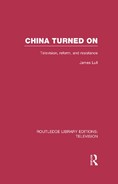Preface
Standing at the top of Tiananmen Gate on a Sunday afternoon in the fall of 1989, looking out over vast and desolate Tiananmen Square that was still under martial law at the time, I realized once again why I am so enamored with China. Thrilling, frustrating, fascinating, disappointing —China is a mystery, even to the Chinese. The public outcry for freedom and democracy and the violent military repression of 1989, in some odd and terrible sense, characterize the extreme ups and downs of China's history since the founding of the People's Republic more than 40 years ago.
The massacre on the streets of Beijing was the government's brutal way to reclaim a country that it had lost. The sharp political confrontation that led to the crackdown in the capital came on the heels of a disastrous downward turn in the economy in the late 1980s. But what has torn China apart goes a long way beyond problems of politics and economics. At the heart of China's unrest is a profound change in the way Chinese people think about themselves, a transformation of cultural consciousness that is the byproduct of the nation's attempt to modernize technologically. What I set out to show in this book is that an unsurpassed contributing cause of resistance to the government in China stems from the unforseen impact of the very showpiece of technological modernization and national reform — television.
This book is an ethnography of culture and communication in contemporary urban China. I place the role of television within the nation's cultural, economic, and political development in the communist era and emphasize what has taken place during the modernization period, beginning roughly at the start of the last decade, when television entered the everyday lives of Chinese families. Rather than just describe how China has changed since then, I offer an explanation. The arguments I construct do not rely on surface impressions or on the insights of 'experts.' The story of China's dramatic cultural and political upheaval told here draws directly from the thoughts and words of Chinese people themselves.
The terrible military crackdown of 1989, of course, has sobered the romanticism that many Westerners, including myself, tend to develop about China. The country that for many years appeared to be the most progressive and promising of communist nations had become in two bloody days among the most repressive and dispirited. Nonetheless, I believe strongly that the world should not, and ultimately cannot, turn its back on China completely. As the influence of world communism erodes in nations as different and distant as Romania and Nicaragua, democratic change will come in its own culturally-specific way to China too. In the meantime, it does not make sense to abandon the Chinese people. Nor should the continuing plea for freedom and democracy there be interpreted primarily in terms of the economic interests of foreign countries. I worry that in the excitement surrounding the fall of repressive communist governments we may lose sight of what the humanitarian principles of socialism mean to the world community.
No one writes a book alone. I want to acknowledge those who have helped me with this project. Unfortunately, given the political climate that exists at the time of this writing, I am unable to thank many individuals in the People's Republic of China who have made enormous contributions to this work. Institutional support in China was given by the People's University, China Central Television, the Shanghai Television station, and the Guangdong Province Television station. Se-Wen Sun's role in the development of this project, described in Chapter 3, was crucial. Ien Ang was, as always, my best critic and discussant. Collette Cowan gave me tremendous emotional support during the hectic last stages of writing. Tommy Kwok's help in Hong Kong and San Francisco is deeply appreciated. My colleagues Phil Wander, Dave Elliott, and Serena Stanford all helped create an atmosphere in which I was able to write. Wen-shu Lee's and Gao Ge's translations and insights were very useful. Alan Howard, Dick Rapson, and especially Stacy Waymire, colleagues and friends on Semester At Sea, greatly enhanced my introduction to China in 1982. Klaus Bruhn Jensen, Jostein Gripsrud, and Kjell Novak made it possible to share some of this work with faculty and students in Denmark, Norway, and Sweden. Thanks to the Volkswagen Foundation for sponsoring a trip to Germany where I had an opportunity to discuss this material with conferees at the 'Rethinking the Audience' meeting in Blaubeuren in 1987. Finally, special thanks to Routledge editors Jane Armstrong and Rebecca Barden for their encouragement in getting this book into print.
James Lull
San Francisco
